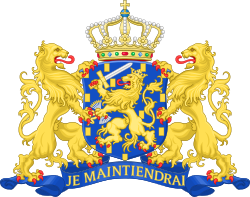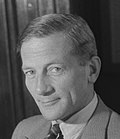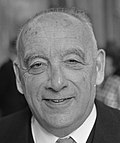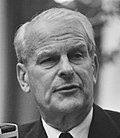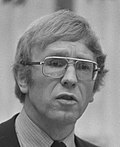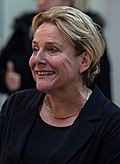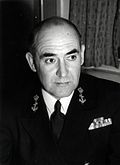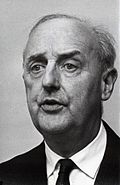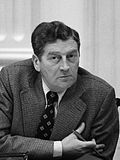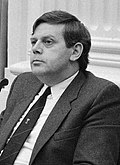Portrait Name Portfolio(s) Term of office Party Cabinet Vice admiral Harry Moorman (1899–1971) • Navy 1 May 1949 – Catholic Drees–Van Schaik Drees I [ 10] [ 11] • Army Navy Air Force 27 November 1950 – • Navy 1 June 1951 – Drees II • III [ 12] [ 13] Beel II [ 14] Wim Fockema (1909–1996) • Army Air Force 1 May 1949 – [Res] People's Party Drees–Van Schaik [ 10] Ferdinand (1911–1994) • Army Air Force 1 June 1951 – [Res] Labour Party Drees I • II [ 11] [ 12] Drees III [ 13] Meine van Veen (1893–1970) 25 October 1958 – Labour Party Lieutenant general Michael Calmeyer (1895–1990) • Army Air Force 19 June 1959 – Christian De Quay [ 15] Captain Piet de Jong (1915–2016) • Navy 25 June 1959 – Catholic Vice admiral Adri van Es (1913–1994) • Navy 14 August 1963 – Anti-Revolutionary Marijnen [ 16] Cals [ 17] Zijlstra [ 18] De Jong [ 19] • Human Equipment 6 July 1971 – [Res] Biesheuvel I • II [ 20] Brigadier general Joop Haex (1911–2002) • Army 14 August 1963 – Christian Marijnen [ 16] Major general Willem den Toom (1911–1998) • Air Force 25 November 1963 – People's Party Gerard (1919–2000) • Army 13 May 1965 – Independent Cals [ 17] Zijlstra [ 18] Colonel Jan Borghouts (1910–1966) • Air Force 12 July 1965 – [Died] Catholic Cals [ 17] Lieutenant general Heije Schaper (1906–1996) 22 June 1966 – Independent Zijlstra [ 18] Major general Joop Haex (1911–2002) • Army 18 April 1967 – Christian De Jong [ 19] Bob Duynstee (1920–2014) • Air Force 28 April 1967 – Catholic Joep (1917–1991) • Human 11 May 1973 – [Res] Catholic Den Uyl [ 21] Brigadier general Cees van Lent (1922–2000) 11 March 1974 – Catholic Christian Van Agt I [ 22] Captain Bram Stemerdink (born 1936) • Equipment Justice 11 May 1973 – [App] Labour Party Den Uyl [ 21] Wim van Eekelen (1931–2025) • Equipment Justice 20 January 1978 – People's Party Van Agt I [ 22] Captain Bram Stemerdink (born 1936) • Equipment Justice 11 September 1981 – [Res] Labour Party Van Agt II [ 23] Jan van (1939–2013) • Human 14 September 1981 – Christian • Human Equipment Van Agt III [ 24] • Equipment Lubbers I [ 25] • Human Equipment Lubbers II [ 26] Charl Schwietert (born 1943) • Human 8 November 1982 – [Res] People's Party Lubbers I [ 25] Willem Hoekzema (born 1939) 19 November 1982 – People's Party Baron Berend-Jan van (1944–2023) • Human Equipment Justice 7 November 1989 – [App] Christian Lubbers III [ 27] Lieutenant colonel Ton Frinking (1931–2022) 1 June 1993 – Christian Lieutenant Jan Gmelich (1936–2012) • Human Equipment 22 August 1994 – People's Party Kok I [ 28] Commander Henk van Hoof (born 1947) • Human Equipment 3 August 1998 – People's Party Kok II [ 29] Cees van (born 1951) • Human Military Equipment 22 July 2002 – [App] Christian Balkenende • II • III [ 30] [ 31] [ 32] Balkenende IV [ 33] Lieutenant Jack de Vries (born 1968) 18 December 2007 – [Res] Christian Vacant Barbara Visser (born 1977) • Human Military Equipment 26 October 2017 – [App] People's Party Rutte III [ 36] Christophe (born 1980) • Human Military Equipment 10 January 2022 – People's Party Rutte IV [ 37] Lieutenant Colonel Gijs Tuinman (born 1979) • Human Military Equipment 2 July 2024 – Incumbent Farmer–Citizen Schoof [ 38] 

